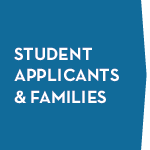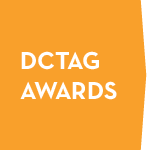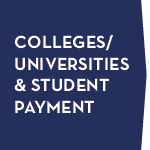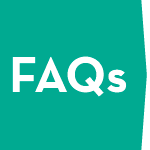Haga clic aquí para ver esta página en español.
ይህንን ገጽ በአማርኛ ለማየት እዚህ ይጫኑ።
DCTAG awards are disbursed directly to your college or university after the last date to add or drop a class (also referred to as the add/drop deadline). The DCTAG award is available for the fall and/or spring semesters, based on your enrollment status. If you have not yet received the annual maximum award for your institution type, you may be eligible to receive funding for tuition covering summer courses. DCTAG does not fund mini-terms or non-accredited online classes.
How much money is provided by the DCTAG award?
The DCTAG program team will work with your college or university to cover your tuition expenses if you are eligible for DCTAG funding, and your school is eligible for DCTAG funding. Please note: Students receiving a DCTAG award will not personally receive the funds.
The award amount that your college or university will receive from the DCTAG program for your account depends on the type of institution you are attending, the difference between in-state and out-of-state tuition, the academic term, your lifetime maximum award amount (see below), and the amount of federal funding appropriated for the DCTAG program.
In all situations, DCTAG recipients are limited to a maximum of six years of receiving awards.
| For public colleges and universities in the US, Guam and Puerto Rico | For four-year private HBCUs, nationwide, and private, not-for-profit colleges and universities in the District of Columbia metropolitan area |
|---|---|
|
DCTAG awards may be up to $10,000 per academic year toward the difference between in-state and out-of-state tuition (awards will be reduced for less than full-time enrollment). |
DCTAG awards may be up to $2,500 per academic year (awards will be reduced for less than full-time enrollment). |
| The $10,000 maximum in this case may be distributed to your institution based on the academic calendar (semester, or quarters). | The maximum will be distributed in this case as up to $1,250 per semester. |
| For a semester, the maximum award is up to $5,000. | The lifetime maximum in this case is $12,500. |
| For quarters, the first two quarters have a maximum of $3,333, and the third quarter has a maximum of $3,334*. | |
| The lifetime maximum in this case is $50,000 | |
| *Please note: While colleges and universities may use a quarter-based system (fall, winter, spring, summer) students are not generally expected to attend the summer quarter, so awards are distributed in thirds. The annual maximum award amounts and lifetime maximum amounts remain the same. For example, you will not receive four payments totaling $13,332 in one academic year. | |
The DCTAG Disbursement Process
- The DCTAG program begins paying invoices from colleges and universities on Oct. 1 each year.
- DCTAG funds will not come in the form of a refund from your institution.
- During each semester, the financial aid office must confirm a student’s enrollment status (after the last day to add a course) and issue an invoice directly to the DCTAG portal (using the DCOneApp).
- Your college or university will submit an electronic invoice to the DCTAG program office for payment. If the invoice is approved, the DCTAG program office will submit the invoice for processing. It can take up to 30 business days for DCTAG funds to be transferred to your college/university.
- Once the invoice is submitted by your college or university, the “Payment History” tab within your DCTAG OneApp online application will allow you to track when your DCTAG funds will be disbursed.
- After the college/university receives the DCTAG funds, the college/university will apply DCTAG funds to the student’s account. Colleges and universities may have their own policy in place related to how and when they disburse funds. Colleges and universities have the option to consider DCTAG funding and other government grants or outside scholarships “pending” or “active” which is a school-by-school decision.
Additional Details
- Before the disbursement process begins, to be eligible for DCTAG funding, your college or university must sign a Program Participation Agreement (PPA) for Public and Private Non-Profit Institutions of Higher Education and submit a W-9 certifying that the tax ID number provided for the institution is correct.
- Next, your eligible college or university will submit an electronic invoice to the DCTAG program office for payment. If the invoice is authorized for payment, the DCTAG program office will submit the invoice to the Office of Finance and Resource Management (OFRM) for fund disbursement. The electronic invoice will include Enrollment Verification information such as student name, social security number (SSN), enrollment status, and tuition amount requested for payment.
- Once the invoice is submitted by your college or university, the “Payment History” tab within your DCTAG OneApp online application will allow you to track when your DCTAG funds will be disbursed.
- After this process is completed, your college or university will credit your student account with the DCTAG funds.
My college says my tuition has not been paid – is my DCTAG award missing?
If your college or university says your DCTAG award has not been processed, these are the steps to take:
- Contact the financial aid office at your college or university with any problems concerning your student account. The financial aid office can determine if your student account is up to date and, if not, how to resolve billing discrepancies.
- If the financial aid office requires assistance, let them know they may contact Melanie Fleming, DCTAG Director, at [email protected] or at (202) 741-6406.
If you require assistance, you may contact your assigned DCTAG advisor at (202) 727‐2824 or 1-877‐485‐6751, or you can find your assigned advisor’s direct contact information here.
Please note: Colleges or universities participating in DCTAG must adhere to the DCTAG Program Participation Agreement in which they agreed to: "Not impose any penalty, late fee, denial of classes or other institution facilities, or requirement that students borrow funds because of an inability to meet financial obligations to the institution as a result of not receiving forth coming DCTAG funds ..."
Please note: Successful completion of the DC OneApp does not guarantee award funding. DCTAG is a federally funded program, so the funds for DCTAG awards are subject to annual appropriation as approved and provided by the District of Columbia and the United States Federal Government.
Refunds
Each semester, students attending college have questions about the possibility of receiving a refund check such as: When will I get it, how much will it be, what can I do with it?
Refunds (also known as “a refundable credit balance”) may be paid to students when the amount of financial aid (their loans, grants, or scholarships) is more than the cost of tuition, fees, books, supplies, and room and board if you live on campus, that is billed by their college or university.
In many cases, loans and other financial aid are intended to cover expenses beyond tuition and fees, such as rent for off campus housing, food, and student living expenses. When this happens, the college or university may issue a refund check directly to students after the college bill is paid.
Timing for Refunds
The timing for when a student receives a refund depends on their college's or university's timeline and other factors. For example, the add/drop period can impact when refunds are distributed.
If you receive financial aid from DCTAG, please know that DCTAG begins paying invoices from colleges and universities on October 1 each year. While DCTAG funds will not be refunded to you (they cover tuition), this timing may impact when your refund from other aid may be distributed. Colleges and universities receiving DCTAG funding on behalf of eligible students agree not to charge students late fees or deny students access to classes, library, housing, other institutional facilities based on the timing of the DCTAG program’s payment. Even if you do not receive a refund, the timing of DCTAG payments should not affect your enrollment.
Please contact your college or university’s bursar’s office or financial aid office to ask about their process for calculating and issuing refunds if you are a student who believes you should receive a refund check based on your total financial aid package.
What can I pay for with a financial aid refund?
Students and families should consider the costs of college that are outside of tuition and fees at the college or university they are attending as they think about using their financial aid refund. Costs to the student or their family beyond tuition and fees may include: Off-campus rent and other housing expenses such as utilities, living expenses such as food, laundry, or transportation (bus fare, gas, parking registration, airfare back home). The DCTAG program office encourages families and students to create a budget each semester to identify what costs students will be responsible for over the next three or four months, and what they might need help covering during that time.
If your budget is less than the refund amount, you may also decide to return or repay part of your student loan balance with your refund check. This would help reduce your overall student loan debt.
Related content: DC Tuition Assistance Grant (DCTAG)







